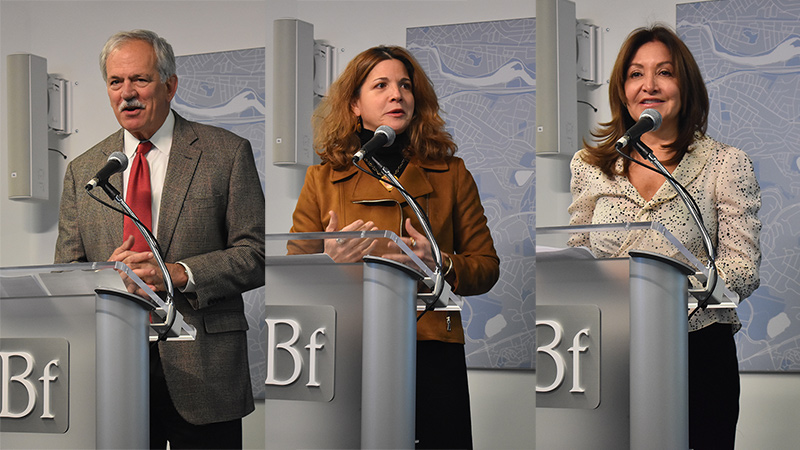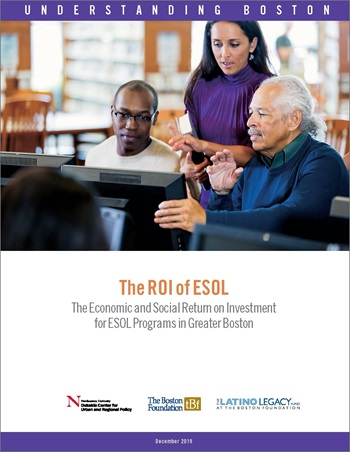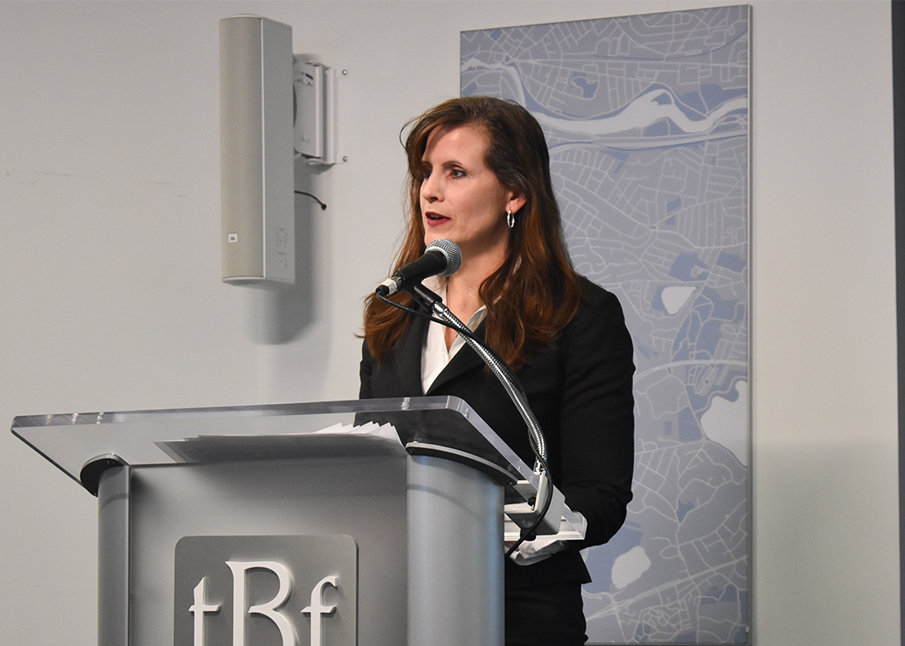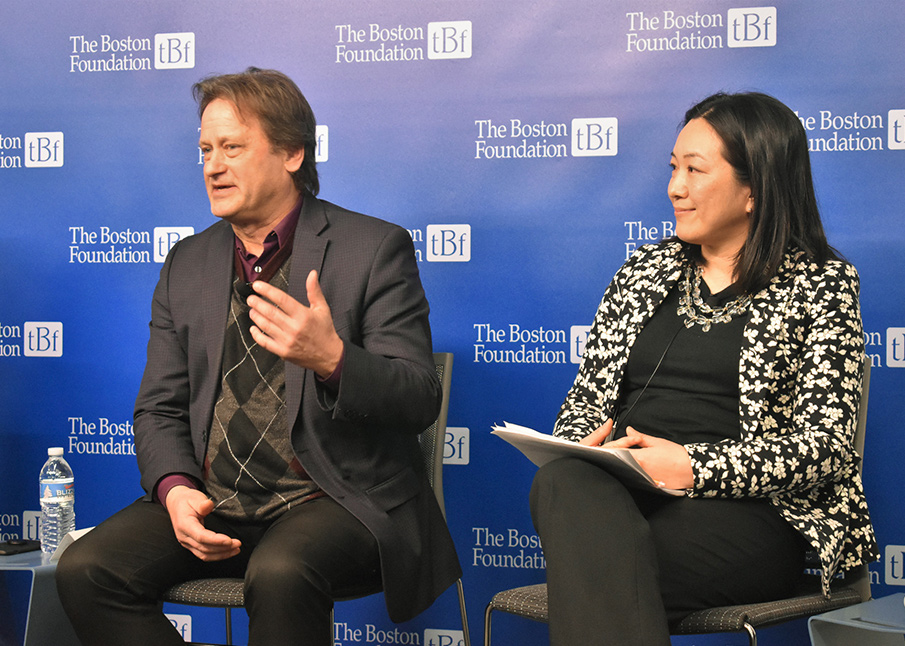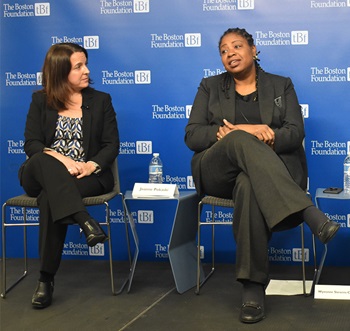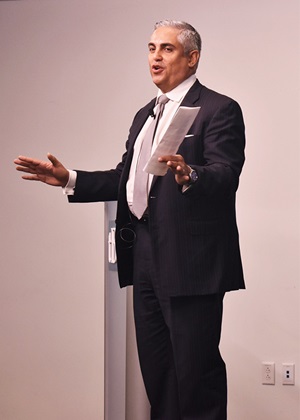The Powerful Economic and Social Returns of ESOL Programming
'The ROI of ESOL' sparks calls for new investment in needed programs
February 6, 2020
Paul Grogan, President and CEO of the Boston Foundation, opened a major forum on February 6 on the topic of ESOL (English for Speakers of Other Languages), with a statement about the Foundation’s priorities. “The Boston Foundation is unabashedly pro-immigrant,” he said. “There is no way to read the history of this country and not conclude that immigration has been a tremendous benefit and continues to be.” He referred to other reports released by the Boston Foundation showing that Greater Boston would have had no population or job growth in the last 30 years without immigration and the economic entrepreneurship immigrants bring.
Aixa Beauchamp, co-founder of the Latino Legacy Fund at the Boston Foundation, spoke next. “The Demographics in this country are changing,” she said. “The 2010 Census projected that by 2050, there will no longer be a racial or ethnic majority in this country and most of the growth is in the Latino and Asian communities. If we do not ensure the success of our immigrants, we will be prevented from fully capitalizing on the global economic advantages we can derive from our increasingly diverse population.” She went on to introduce Rosalin Acosta, Secretary of Labor & Workforce Development for the Commonwealth of Massachusetts.
“For me this topic is very personal,” said Acosta, explaining that her parents came here from Cuba when she was just four. They had been university professors in their home country, but ended up working in factories when they came to America. “They eventually went back to work as teachers, but it took 12 years for them to get there. Think about the disadvantages they experienced.” She thanked the Boston Foundation and the Latino Legacy Fund, of which she is a member, for publishing the important report.
Titled The ROI of ESOL: The Economic and Social Return on Investment for ESOL Programs in Greater Boston, the report was written by a research team at The Kitty and Michael Dukakis Center for Urban and Regional Policy at Northeastern University, and was publicly released today at the forum. It finds that vocationally-focused English for Speakers of Other Languages (ESOL) programs can have an almost immediate payback for students and for our community. However, the number of ESOL seats of any kind for adults in Greater Boston falls woefully short of the need, with a serious shortage of programs that focus on ESOL training to enhance professional or job-related skills and opportunities.
The team, led by Alicia Sasser Modestino, compiled a landscape analysis of ESOL programs in Greater Boston. They found 116 programs with a capacity of approximately 11,600 students annually, serving a population of more than 240,000 working-age adults in Greater Boston with Limited English Proficiency (LEP). While foreign-born adults exist across the educational spectrum, their highest shares are of residents with less than a high school diploma or more than a college degree. Although the greatest need for ESOL services can be seen at the lower levels of educational attainment, this diversity can make it challenging to meet the needs of Limited English Proficiency (LEP) persons who do not speak English as their primary language and who have a limited ability to read, speak, write, or understand English. An estimated 63 percent of adults with less than a high school diploma in the city of Boston have Limited English Proficiency.
The report identified an ongoing shortage of ESOL programs in Greater Boston, where the overall need for ESOL opportunities far outstrips the supply by a ratio of 20:1. Equally concerning is the dearth of programs that focus on work-related English language education. Just seven percent of the programs identified by the researchers could be classified as vocational or workplace-focused in nature. The majority were classified as general purpose, or more directly targeted toward citizenship.
“While the data show Greater Boston could certainly benefit from expanding the number of ESOL seats, the shortage is exacerbated by a serious misalignment between the type of ESOL services currently provided and the needs of a quarter million working-age LEP adults in the region who are often seeking better job opportunities,” said Sasser Modestino.
The researchers also found that among the vocational ESOL programs that were available, they provided measurable benefits for students. Using the limited data available, researchers found that 67 percent of unemployed students who enrolled in vocational ESOL programs were placed in jobs within six months of enrollment, versus about a third of participants overall in programs funded by the Massachusetts Department of Elementary Education.
Exploring data from one vocational ESOL program found that public funding in such programs could be expected to earn back their investment in students within five years, based on the estimated increase in tax payments from students garnering new jobs and/or higher incomes with their new language skills. Adding to the calculation that many students are able to move from state-provided health insurance through MassHealth to employer-sponsored health insurance with their new jobs accelerates the estimated break-even time to just 18 months.
The report ends with a call for strategic leadership and investment in six areas that could lead to the needed transformative changes in the ESOL system. The researchers recommend efforts to strengthen the system by: improving working conditions for ESOL teachers; increasing the number of programs; providing enhanced supports for students; connect a fractured system; and improving data going forward.
A Panel Discussion Brings the Topic Home
Following the report presentation, Keith Mahoney, the Foundation’s Vice President of Communications and Public Affairs, moderated an excellent panel discussion. The first speaker, Shinobu Ando, is Director the Next STEP program at the Asian American Civic Association (AACA), which teaches 10 levels of ESOL to immigrants, with Next STEP making up the most advanced levels. She shared success stories that beautifully illustrated the power of ESOL instruction. One was about a woman who came here from Brazil with a degree in pre-law. She didn’t speak English well and had no job. She took one of the AACA ESOL programs, went on to a community college and used that as a stepping stone to get back into law school. Today, she is an immigration attorney in Boston.
Another graduate of the AACA class came here from Egypt with a degree in history and very limited English skills. He worked an overnight shift in a bakery, and attended ESOL classes after work. Eventually he started taking classes at a community college and was encouraged to apply for a Masters of Education program. Now he is working in a public school helping other immigrant families and children adjust to life in Boston.
Ando made the point that many graduates of AACA’s programs go on to give something back to the community that has supported them.
To tell his story, panelist Kermit Dunkelberg, Assistant Vice President of Adult Education and Workforce Development at Holyoke Community College, used the example of a specific labor pool, but hastened to add that the hurdles are the same for other workers. He focused on nurses who came to Massachusetts after that island’s devastating hurricane. They struggled to transfer their education and work experience so that they could be certified here, even though the nursing curriculum in Puerto Rico is exactly the same as it is here. “Currently there are so many barriers to becoming certified,” he said, “including an extremely difficult, academic English proficiency test that even I would have a hard time passing.” While pushing for new English tests for immigrant health care workers that would focus primarily on medical care, his college strives to be flexible within the current system by holding classes on the best days for learners and offering online assignments.
Mahoney asked Joanne Pokaski, Senior Director of Workforce Development and Community Relations at Beth Israel Deaconess Medical Center, to continue the discussion about jobs in the health care field. “Historically, our challenge has been in filling middle-skill jobs,” she said, which led the hospital to give its entry-level staff the skills they need—including ESOL classes—to move up and fill those jobs. Now, the fact that the hospital offers ESOL is what she called an “enticement for entry-level workers” who are also becoming harder to find because of the numerous jobs at the new casino.
Wyvonne Stevens-Carter, Director of Adult Education for the Commonwealth of Massachusetts, agreed with all of the issues discussed by the panelists, but said that it was going to take a lot of work to break down the silos and barriers in the current ESOL system and develop new tests and assessments that will solve the problems facing the field.
Pokaski expressed frustration about the slow progress in solving those problems. “So many of us have been in a room discussing how important this issue is to our economic prosperity. I don’t think that message is coming through to mainstream businesses. Every time we hear someone express frustration about immigration, we have to speak up and say that this state is not going to prosper if we don’t welcome and invest in immigrants.”
Questions from the audience picked up on the theme of getting more businesses and employers involved in helping to solve the issue. One audience member said it would be the perfect thing for the Boston Foundation to do. Mahoney pointed out that the Foundation does not release reports to have them sit on shelf. “We have a strong public policy advocacy program,” he said, “and we don’t hesitate to use it.”
After the question and answer period, Latino Legacy Fund co-founder Juan Carlos Morales closed the forum by saying that the problems discussed during the forum are “solvable.” He called out one of the largest supporters of ESOL programming, English for New Bostonians, a nonprofit organization that was launched with start-up funding by the Boston Foundation and today supports 21 high-quality English language-learning programs throughout the city. He then asked the audience to do three things: raise their voices, open their wallets and volunteer as ESOL instructors, adding: “To continue Boston’s renaissance, we have to solve this problem.”
To learn more about the Boston Foundation's Latino Legacy Fund and explore opportunities for supporting its work, please visit the Fund page on tbf.org

